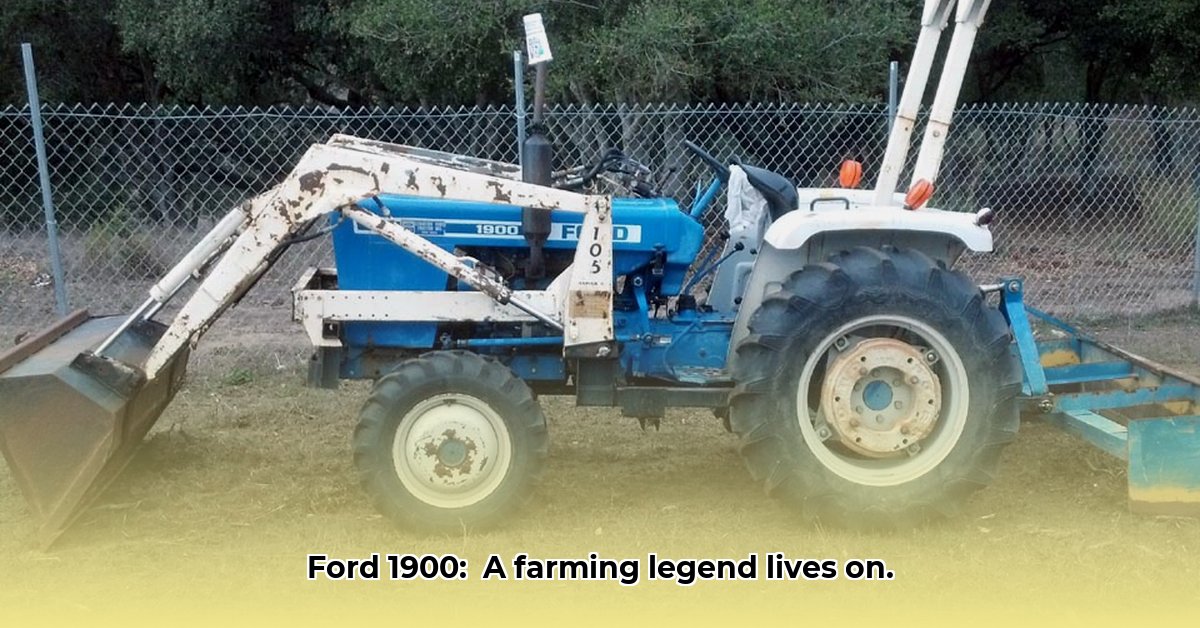
The Ford 1900 tractor, a stalwart of farms between 1979 and 1983, offers a compelling case study in sustainable agricultural practices. While seemingly simple compared to modern machinery, its design and operational characteristics reveal surprising relevance in today's environmentally conscious farming landscape. This analysis explores the Ford 1900's sustainability, comparing it to modern compact tractors and highlighting practical applications for contemporary farmers. For more information on early Ford tractors, see this useful resource.
Assessing the Ford 1900's Sustainability Metrics
Analyzing the sustainability of the Ford 1900 requires a multifaceted approach, examining factors beyond mere fuel efficiency. While its 7.7-gallon fuel tank suggests relatively low consumption compared to larger tractors, its lower horsepower rating (approximately 20-30 hp) must be considered. This lower power output naturally translates to reduced fuel usage, but also limits the scale of operations. A comprehensive assessment necessitates considering the tractor's entire lifecycle, from manufacturing to disposal, information that's often difficult to obtain for older equipment. This lack of data underscores a broader challenge in assessing the true sustainability of agricultural machinery.
Durability and Longevity: A Key Sustainability Factor
How long did Ford 1900 tractors typically last? This question is crucial for evaluating their sustainability. While precise data on average lifespan is scarce, anecdotal evidence suggests remarkable durability for many meticulously maintained units. This longevity, paired with its relatively simple mechanical design, suggests a lower overall environmental impact compared to tractors requiring frequent part replacements and more complex repairs. However, a lack of comprehensive, readily available data regarding maintenance and repair frequency limits a precise quantitative analysis.
Adaptability and Versatility: Minimizing Resource Consumption
A significant sustainability advantage of the Ford 1900 lies in its versatility. Its three-point hitch system allowed for a wide range of attachments, from mowers and snowplows to loaders and backhoes. This adaptability reduced the need for a fleet of specialized machines, minimizing both capital investment and resource consumption. This aligns with fundamental sustainable farming principles: maximizing resource utilization and minimizing waste. This feature directly translates to reduced environmental impact and financial savings for the farmer.
Ford 1900 vs. Modern Compact Tractors: A Comparative Analysis
Modern compact tractors offer significantly higher horsepower and advanced technologies like fuel injection and electronic controls, resulting in improved fuel efficiency per unit of work. However, this efficiency comes at a cost. The initial purchase price is higher, and sophisticated electronics mean more complex — and often more expensive — repairs. "The trade-off between initial cost and long-term maintenance needs to be closely evaluated," states Dr. Emily Carter, Professor of Agricultural Engineering at Purdue University. "The Ford 1900's simplicity may have a hidden advantage in terms of overall lifecycle cost and environmental impact." The higher initial investment and potential future repair costs of modern compact tractors raise questions about their long-term sustainability advantage over simpler, more durable machines like the Ford 1900.
The Ford 1900's Legacy: Lessons for Sustainable Farming
The Ford 1900's enduring relevance in the context of sustainable agriculture stems from several key factors:
- Simplicity and Durability: Its comparatively simple design promotes longevity and reduces the need for frequent repairs and part replacements.
- Versatility and Adaptability: The three-point hitch system allows for diverse applications, minimizing the need for specialized equipment.
- Resource Efficiency: The lower horsepower rating, while limiting operational capacity, leads to lower fuel consumption.
These features highlight a valuable lesson: sustainability isn't solely about technological advancement; it's about strategic resource management and durable, adaptable designs. Continued research into optimizing both modern and older tractor technologies is crucial for achieving truly sustainable farming practices.
Practical Considerations for Modern Farmers
The Ford 1900's legacy isn't just historical; it offers practical implications for today's farmers:
- Consider used equipment: Exploring the used tractor market, specifically models like the Ford 1900, can provide cost-effective alternatives to new equipment.
- Prioritize maintenance: Regular maintenance is crucial for extending the lifespan of any tractor, maximizing its value and minimizing environmental impact.
- Assess your needs: Choosing the right equipment size and power for specific tasks is essential for optimal resource utilization.
- Explore repair and restoration options: Investing in repair skills or establishing relationships with skilled mechanics specializing in older tractors can significantly reduce long-term costs.
The Ford 1900, despite its age, provides a valuable lens through which to examine sustainable practices in agriculture. Its simplicity, durability, and versatility offer valuable lessons for farmers and researchers alike, underscoring the importance of considering both technological advancement and the enduring principles of resourcefulness and efficiency.